- Home
- Seanan McGuire
Velveteen vs. The Junior Super Patriots Page 5
Velveteen vs. The Junior Super Patriots Read online
Page 5
They’d tested her powers pretty thoroughly, but they could only test up to the limits of her participation, not up to the limits of what she could actually do. Placing two fingers in her mouth, Velma whistled shrilly. And the giant statues of the founders of The Super Patriots stood up, scooped her and Yelena into their hands, and carried them into the future.
There’d be time to regret it later.
Lots of time to regret it.
*
“LADIES AND GENTLEMEN!” The announcer’s voice boomed out across the arena in exactly the way that it was meant to, carrying undertones of barely-suppressed excitement, and the twinkling glee of a man who was about to give out the secrets of creation itself . . . or at least the names of the newest members of The Junior Super Patriots, West Coast Division. The arena, predictably enough, went nuts.
Behind the shimmering curtain of Interrogation’s invisible wall, Velma squirmed, trying to get her leotard to stop crawling up her butt. It wasn’t working terribly well. At least her “official” costume was less offensive than her audition costume had been. She still had the unwanted leotard-and-tights combo, but her new leotard was dark brown, and her new tights were a tolerable shade of pink. And they’d given her ankle boots and a utility belt (even if they’d made her keep the tail). With that, the rabbit ears, and the domino mask, she really looked like the heroine they were pretending she was going to be.
“I think I’m gonna throw up,” said Yelena conversationally. She looked distinctly green, although that could have just been her rainbow powers kicking in again. They had a tendency to change her skin tone when she got stressed, and being presented in front of thousands of screaming fans was definitely stressful. “Do you think they’d notice?”
“They’d notice,” said David morosely. David did almost everything morosely. Probably because his costume didn’t require him to wear any pants, which had to be bad for his ego.
“YOU’VE WITNESSED THE BEST AND BRIGHTEST OF THE NEW GENERATION OF HEROES! THE SAVIORS OF TOMORROW! THE STARS OF THE FUTURE!” The announcer was really hitting his stride now, and the audience sounded like they were going insane.
Velma gave Yelena’s hand another squeeze. “Don’t worry. They’re going to love you as much as I do.”
“They’re going to love you, too,” murmured a voice next to her ear. Velma turned to find herself looking straight into the eyes of Aaron Frank, also known as “Action Dude.” She felt herself go red. He grinned.
She was still blushing when the invisible wall came down and the four of them were exposed to their public in costume for for the first time.
“SPARKLE BRIGHT! THE CLAW! VELVETEEN! ACTION DUDE! I GIVE YOU—THE NEWEST MEMBERS OF THE JUNIOR SUPER PATRIOTS, WEST COAST DIVISION!”
The screaming of the crowd seemed almost loud enough to drown out the pounding of Velma’s—of Velveteen’s—heart. She squeezed Sparkle Bright’s hand tightly in hers, and smiled out at the arena, and knew, then and there, that she was going to be a superhero forever.
*
Thirteen years later . . .
Velma’s room at the Good Time Gas-n-Go’s no-tell motel was as dark as the thin mesh curtains could make it; they were drawn shut, but the neon lights of the truck stop still filtered through. No matter; the room’s single occupant was out cold, too deeply sunk in sleep for anything short of an all-out supervillain attack to wake her. Even that might have just earned a thrown pillow and a muttered demand that the combatants keep it down already. She’d fallen asleep with the television on, blaring the night’s third rerun of the most recent Junior Super Patriots, West Coast Division results show. Various garishly-clad contestants flew, fought, and used psychic powers to navigate a series of improbable obstacles. At the end of the maze, the prize to end all prizes: membership in The Junior Super Patriots, West Coast Division, and eventually—if you were quick and clever and could keep yourself breathing long enough—ascension to the ranks of The Super Patriots, West Coast Division, where the marketing dollars and the really cool supervillains were found. The blue ribbon.
It was fixed. It was all fixed, always, every year, because there weren’t nearly as many superhero hopefuls as the media wanted people to think. Too many of the superhumans that manifested in any given year were flawed in some way, driven insane by their powers, killed by the radiation that made them, or simply unable to survive in an atmosphere that they were no longer suited for. So they recycled the same twenty or thirty extras over and over again, hiding their faces behind brightly-colored masks, and used them to promote the illusion that only the best of the best of the best would ever have the right to call themselves Super Patriots.
It was all a lie, but once upon a time, that hadn’t mattered, because once upon a time, that syrupy theme music had been the song of hope, and those horrible costumes had been the flags of freedom. Of a world where it didn’t matter if you weren’t normal, because normal didn’t stop the alien invasions or crush the giant robots. Superhumans were licensed because people were afraid of them, just as much as people idolized them. But once, that didn’t matter. Once, it was all going to be okay.
Velma slept with teddy bears and action figures guarding her bedside, like a princess of toyland, and the song of The Super Patriots eased her deeper and deeper down into her dreams.
*
Might and flight
Defend your rights
Protectors of the skies,
While tele-s port
And tele-s path
Stop evil where it lies.
American as apple pie,
Enhanced by liberty,
Look up and wave as they pass by,
Those heroes, flying free . . .
*
The identity of the first superhumans has been a subject of hot debate for decades, and is unlikely to be resolved any time soon. After all, so many superhumans manifest with powers that are easy to overlook, and it could have been years before any showed up with a combination of abilities that would get them noticed. Before superhuman screening became commonplace, how would Garden Show, with her uncanny ability to raise any flower to perfect health—providing she was given access to gardening supplies, and had the standard growing period—have ever been spotted? Or Kennel Club, the champion dog trainer who was later found to be a command telepath whose powers only worked on the dogs he worked with? No, there’s no way of knowing how long the superhumans were among us before their cover was blown. But once that cover was removed, there was no going back.
Every schoolchild knows the identities of the first three. Majesty, first superhuman to manifest both flight and superstrength (oddly, one of the more common combinations), raised in a small town in upstate Vermont. His abilities were later linked to irradiated maple syrup. Several more cases of superhuman manifestation would occur during the years following his first appearance, as that irradiated syrup found its way from IHOPs around the country into the transgenically susceptible bellies of children and pregnant women. Jolly Roger, the first of the so-called “fantasy heroes,” who drew his power from the world’s obsession with pirates through a psychic link that scientists have remained unable to explain even to this day. And Supermodel, subject of a million erotic fantasies and source of two million severe eating disorders, whose mutation made her the most beautiful, irresistible thing in any given room, yet inevitably drained the beauty from everything around her. They were the first Super Patriots, serving their country through the use of powers that no one came anywhere close to understanding. They were amazing. They were awesome. They were everything the common man wasn’t.
They were too good to be true. And in the end, they weren’t true at all.
The reality behind what happened to the first three Super Patriots was quickly and quietly suppressed by both The Super Patriots, Inc., and the United States government. It wasn’t Super model’s fault, they argued; her powers were uncontrollable on a quantum level, and she had no way of knowing that they were quietly and constantly erodi
ng the goodness of her teammates. Nor was it the fault of Majesty or Jolly Roger, driven to evil by Supermodel’s constant presence. Majesty, Super model, and six of the company’s eleven trainee heroes died in an epic battle that has been attributed to everything from alien mind control to evil duplicates from a parallel dimension. By the time the spin doctors were done, the truth didn’t matter anymore. All that mattered was keeping it hidden.
Every schoolchild also knows the identity of those five trainee heroes, suddenly elevated to the ranks of Super Patriots in the wake of their tragic loss. Imagineer. Trick and Treat, whose daughters, the lovely Candy girls, have only recently followed in their parents’ footsteps. Deadbolt. Second Chance. They rebuilt a company. They founded an empire. They sleep just fine at night, thank you very much.
All communities have their secrets, and their mysteries. Where did the superhumans come from? Who was the first?
What happened to Jolly Roger?
*
Thirteen years ago . . .
Velma wasn’t entirely sure what she’d expected to happen after she and the others made the team. They’d never really been given details on what membership in The Junior Super Patriots, West Coast Division, would mean, although she had the vague idea that it would include ice cream, and possibly a trip to the circus.
The most immediate change was in their living quarters. They’d barely left the stage before the woman from Marketing was whisking them off to a new part of the compound, chattering away a mile a minute as she led them through the increasingly twisted hallways. “—pay upgrade means, of course, that you can absolutely afford all of this,” she was saying, with high-pitched glee. “Only the best for our newest heroes! And of course, the pay increase is effective immediately, although contract negotiations won’t be able to start until next week, you understand, of course, we need to get the legal team back from the Inverse Dimension, and notify your parents that you’ve been elected to the team. All release forms were signed and filed before you were allowed to enter the trials, of course—”
Velma had been holding tight to Yelena’s hand ever since they left the stage. Leaning toward the other girl, she murmured out of the corner of her mouth, “I think she gets a quarter every time she can manage to say ‘of course.’”
Yelena smothered a giggle.
Coming to a sudden halt, the woman from Marketing turned to shoot a venomous glare back toward the quartet. “I hope you realize what an honor and a privilege it is to serve with The Junior Super Patriots, West Coast Division,” she said sharply. “There are a great many children who would give anything to be standing where you are right now. Anything. Do you understand me?”
“Yes, ma’am,” said Aaron, in his best “dealing with the crazy grown-ups” tone. He was very good at that tone, and at the things that came with it—the getting along, the getting on with other people. Velma was too cranky (“a lot of repressed anger,” said the company psychiatrist), Yelena was too timid (“serious self-image issues”), and David was too morose (“we’re not even sure where to start”). Aaron, on the other hand, was the all-American boy on whose prepubescent shoulders the Marketing Department was already planning to build a fresh new empire. “We’re just excited because of the trials, ma’am, that’s all.”
From anyone else, it would have sounded smarmy. From Aaron, it just sounded sincere. Predictably, the woman from Marketing’s irritated expression melted into the sappily understanding look that adults tended to have around him. “Well, all right,” she said. “I guess I can’t quash youthful high spirits. Anyway, we’re here.” She waved a hand dramatically, indicating the two nearest doorways. “Your new living quarters.”
Of the many lessons that Velma had learned since accidentally reanimating the museum’s Natural History wing, the one that currently seemed to matter most was that anything people called “living quarters” was not actually the same as “bedroom.” At least these rooms seemed less generic from the outside; their names had been stenciled on the door, hers in warm chocolate brown, Yelena’s in glittery rainbow. Or rather, their hero names had been stenciled on the door. Here, inside the compound, there was no place for Velma and Yelena and Aaron and Dave. Just the heroes that they were intended to become.
“They look . . . nice,” said Yelena, timidly. Yelena was always timid around adults. Velma was starting to suspect that she wasn’t the only one who’d had a less-than-happy home life.
“Oh, they’re better than nice,” enthused the woman from Marketing. “They’re yours.” Before any of the four could decide how they were supposed to react to that, she stepped forward, opening one door with each hand and stepping back, fingers spread in a dramatic flourish. “Welcome home.”
On the other side of the beautifully-painted doors were . . . tiny, white, almost featureless rooms that wouldn’t have been out of place in a hospital. They were, in short, identical to the bedrooms in the bunkers, with the exception that Velma and the others had taken the time to personalize their rooms in the bunkers. These rooms were devoid of any such familiar little touches. They weren’t anything like a home.
Seeing Yelena’s eyes starting to fill with tears, Velma gave her hand a fierce squeeze and asked, “Do we get paint or construction paper or anything that we can use for decorating? They’re sort of, well. Empty right now.”
“That’s your first test, you darling little rascal,” said the woman from Marketing, an almost malicious glimmer coming into her eyes. “You can decorate your rooms just as soon as you find a way to do it with your powers. Now, I realize none of you have material capabilities, so that just means you’ll need to figure out ways to become profitable all the faster. Then you’re welcome to use your share of the merchandising and appearance fees to do whatever you like.” Still smiling, she took a step backward. “Now, you’re all expected for a press conference first thing tomorrow morning. Why don’t you go ahead and get some rest? We want our newest heroes to be at their very best when they meet their public!” Turning quickly, she went striding down the hall, leaving the four to stare after her in dismay.
“I thought we fought supervillains,” said David, sourly. “Nobody said anything to me about working for them.”
That was too much for Yelena. She began crying silently, her tears leaving glittery trails down the sides of her face. Sighing, Velma gathered her into a hug. “It’s okay. You’ll see. It’ll be okay. We’re going to make so much money we can build palaces if we want to.”
Yelena sniffled, eying her suspiciously. “Promise?”
“Yeah.” Velma gave a firm nod, matching it with an even firmer squeeze. “Promise.”
*
Ten years ago . . .
Velma Martinez, age fifteen: almost more comfortable in costume than she was out of it, equally likely to answer to “Velveteen” and “Velma” . . . although she strongly suspected that was only because both her names began with “V.” Action Dude still answered to “Aaron,” after all, while David and Yelena had practically abandoned the names that they were born with. Those kids were gone, entirely unmoored, because two much brighter stars had risen in their place: The Claw and Sparkle Bright, two of the core members of the current lineup of The Junior Super Patriots, West Coast Division. Velma and Yelena had been rooming together for three years, and Yelena didn’t cry in her sleep anymore. Not as much, anyway. Whatever she was trying to put behind her, it had been bad, bad enough that she’d embraced the company conditioning with open arms. Unlike her roommate and best friend, who continued to view the whole situation with grudgingly accepting suspicion.
Velma Martinez, age fifteen, better known to the world as Velveteen, mistress of the toy box, holder of no fewer than six global spokes-kid contracts with various toy shops and manufacturers. Velveteen was the one who’d been invited to participate in the Macy’s Thanksgiving Day Parade, waving from her place on Santa’s sleigh. Velveteen was the one whose action figures were distributed as an intentional rarity, due to their “awesome power�
� over the rest of the set (more crap from Marketing, but oh, how the public loved their crap. . .), leading to an incredible price tag on the collector’s market. Velveteen was the one that they wanted. Not Velma.
Velma Martinez, age fifteen, wearing an itchy, formal version of her usual costume—itchy, formal, and made entirely out of black and gray—and wishing like hell that there was a way for her to actually step aside and let Velveteen run the show. She’d never been to a funeral before, had always managed to be out of the dimension or in the infirmary when they happened. She didn’t know how you were supposed to act or what you were supposed to say. The media was bound to be in attendance. The media was always in attendance for something like this.
She wasn’t even sure whether or not she was allowed to cry.
Velma Martinez, age fifteen: still standing frozen in front of her mirror, wondering if she needed to adjust her ears, wondering whether it was too late to claim that she was sick, or frozen in time, or stranded in the Inverse Dimension, when the door to the bedroom opened and Action Dude stuck his head inside, looking like his own ego twin in his black and gray costume.
“Vel? They said to come and get you.”
Velma didn’t answer.
Sighing, Action Dude came into the room and walked up behind her, resting his hands on her shoulders. “There has to be a funeral, Val,” he said, gravely. “All the precogs looked forward, and she’s not slated for a return in the current timeline. Unless there’s another cosmic event, Diva’s gone for good.”
“I never liked her,” Velma mumbled, glancing down at her hands. Anything was better than meeting Aaron’s eyes in the mirror.
“What?”
“Diva. I never liked her. They said she was what, Super model’s little sister? Only smarter, and prettier, and in control of her powers? Supermodel was twenty years ago, and her parents were dead. That origin story didn’t even make sense, but everybody believed it. And she was just such a stuck-up, nasty, snotty little—”

 A Local Habitation
A Local Habitation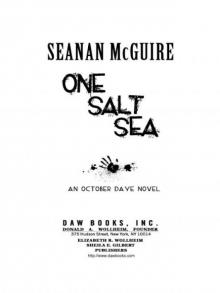 One Salt Sea
One Salt Sea Beneath the Sugar Sky
Beneath the Sugar Sky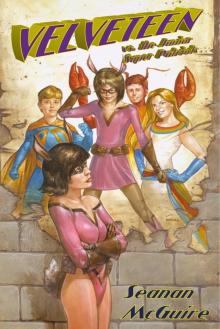 Velveteen vs. The Junior Super Patriots
Velveteen vs. The Junior Super Patriots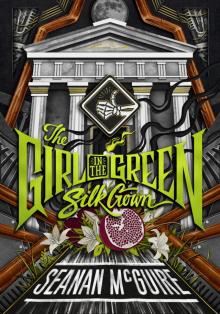 The Girl in the Green Silk Gown
The Girl in the Green Silk Gown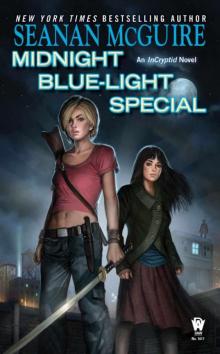 Midnight Blue-Light Special
Midnight Blue-Light Special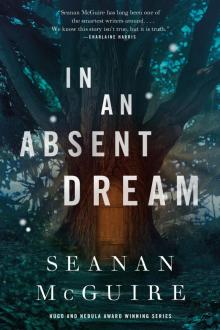 In an Absent Dream
In an Absent Dream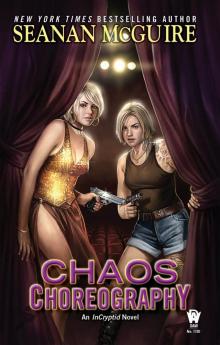 Chaos Choreography
Chaos Choreography Indexing
Indexing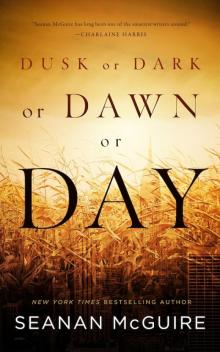 Dusk or Dark or Dawn or Day
Dusk or Dark or Dawn or Day Down Among the Sticks and Bones
Down Among the Sticks and Bones The Razor's Edge
The Razor's Edge Midway Relics and Dying Breeds
Midway Relics and Dying Breeds Pocket Apocalypse
Pocket Apocalypse The Brightest Fell
The Brightest Fell Discount Armageddon
Discount Armageddon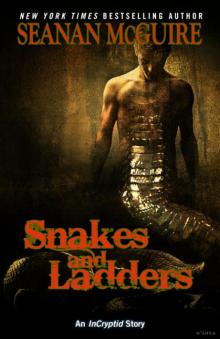 Snakes and Ladders
Snakes and Ladders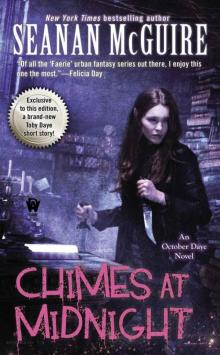 Chimes at Midnight
Chimes at Midnight Broken Paper Hearts
Broken Paper Hearts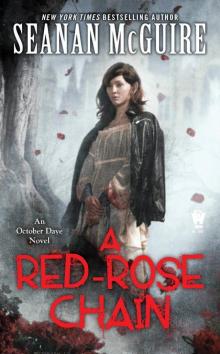 A Red-Rose Chain
A Red-Rose Chain Married in Green
Married in Green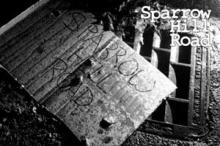 Sparrow Hill Road 2010 By Seanan
Sparrow Hill Road 2010 By Seanan Calculated Risks
Calculated Risks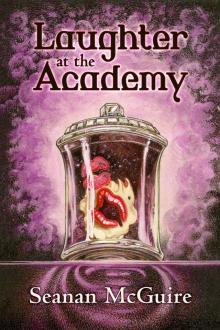 Laughter at the Academy
Laughter at the Academy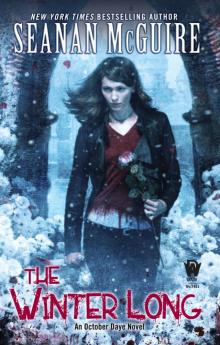 The Winter Long
The Winter Long We Both Go Down Together
We Both Go Down Together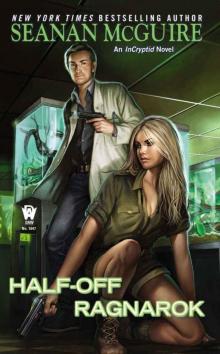 Half-Off Ragnarok
Half-Off Ragnarok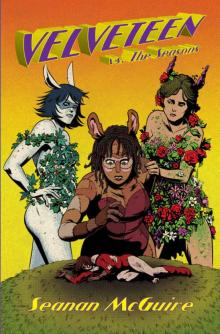 Velveteen vs. The Seasons
Velveteen vs. The Seasons Boneyard
Boneyard A Killing Frost
A Killing Frost Late Eclipses
Late Eclipses Submerged
Submerged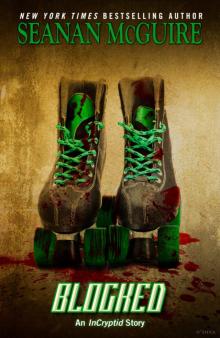 Blocked
Blocked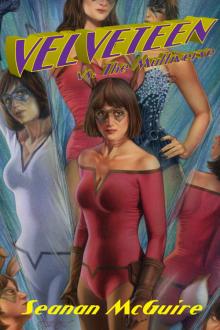 Velveteen vs. The Multiverse
Velveteen vs. The Multiverse Night and Silence
Night and Silence The Unkindest Tide (October Daye)
The Unkindest Tide (October Daye)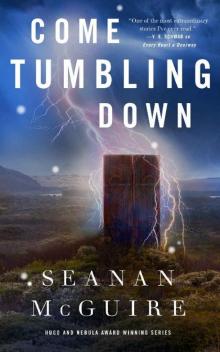 Come Tumbling Down (Wayward Children)
Come Tumbling Down (Wayward Children)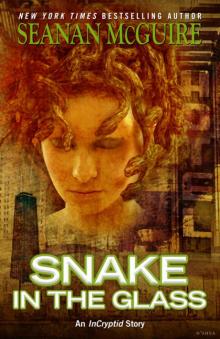 Snake in the Glass
Snake in the Glass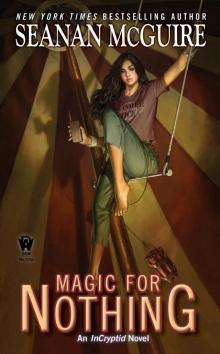 Magic for Nothing
Magic for Nothing Full of Briars
Full of Briars Oh Pretty Bird
Oh Pretty Bird The First Fall
The First Fall Once Broken Faith
Once Broken Faith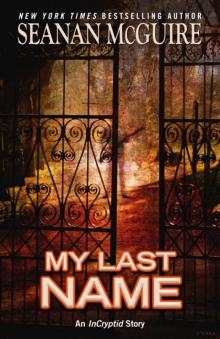 My Last Name
My Last Name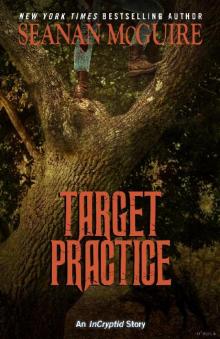 Target Practice
Target Practice Wayward Children 01 - Every Heart a Doorway
Wayward Children 01 - Every Heart a Doorway Sparrow Hill Road
Sparrow Hill Road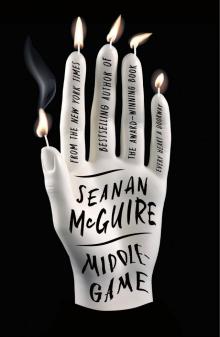 Middlegame
Middlegame Juice Like Wounds
Juice Like Wounds That Ain't Witchcraft
That Ain't Witchcraft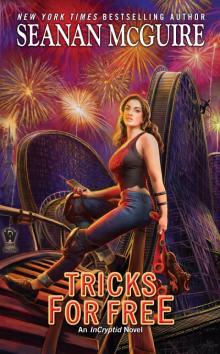 Tricks for Free
Tricks for Free Imaginary Numbers
Imaginary Numbers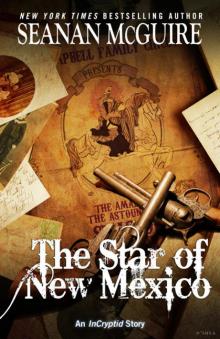 The Star of New Mexico
The Star of New Mexico Lay of the Land
Lay of the Land One Hell of a Ride
One Hell of a Ride Bury Me in Satin
Bury Me in Satin Heaps of Pearl
Heaps of Pearl Sweet Poison Wine
Sweet Poison Wine When Sorrows Come
When Sorrows Come Every Heart a Doorway
Every Heart a Doorway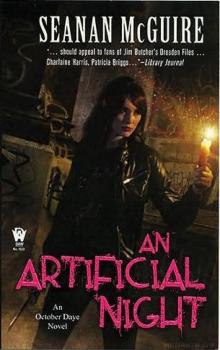 An Artificial Night - BK 3
An Artificial Night - BK 3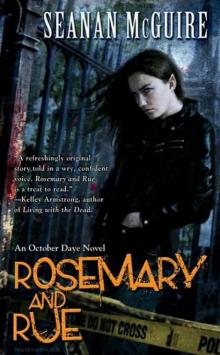 Rosemary and Rue
Rosemary and Rue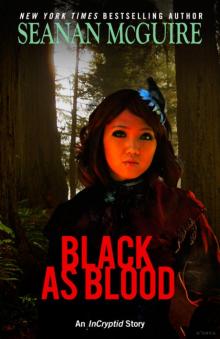 Black as Blood
Black as Blood Loch and Key
Loch and Key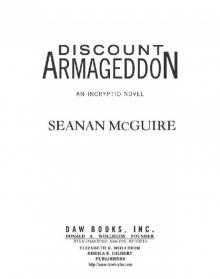 Discount Armageddon: An Incryptid Novel
Discount Armageddon: An Incryptid Novel The Unkindest Tide
The Unkindest Tide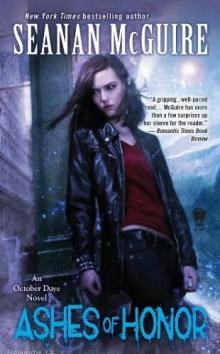 Ashes of Honor od-6
Ashes of Honor od-6 A Local Habitation od-2
A Local Habitation od-2 Waking Up in Vegas
Waking Up in Vegas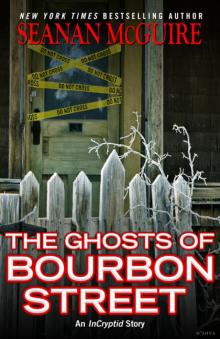 The Ghosts of Bourbon Street
The Ghosts of Bourbon Street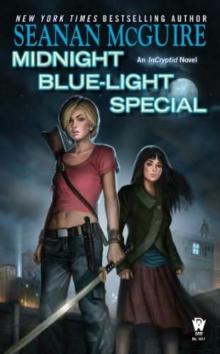 Midnight Blue-Light Special i-2
Midnight Blue-Light Special i-2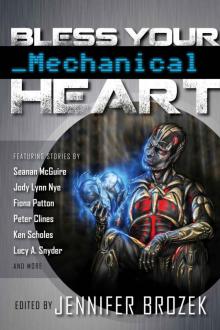 Bless Your Mechanical Heart
Bless Your Mechanical Heart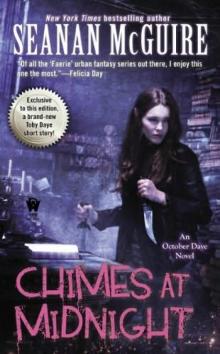 Chimes at Midnight od-7
Chimes at Midnight od-7 The Way Home
The Way Home Indexing (Kindle Serial)
Indexing (Kindle Serial) Pocket Apocalypse: InCryptid, Book Four
Pocket Apocalypse: InCryptid, Book Four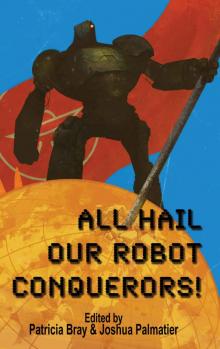 All Hail Our Robot Conquerors!
All Hail Our Robot Conquerors!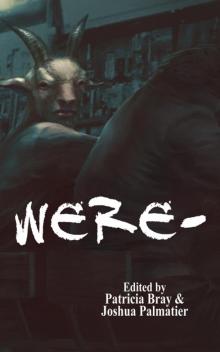 Were-
Were- That Ain't Witchcraft (InCryptid #8)
That Ain't Witchcraft (InCryptid #8) Night and Silence (October Daye)
Night and Silence (October Daye) Late Eclipses od-4
Late Eclipses od-4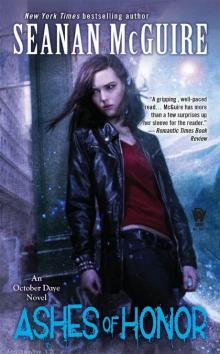 Ashes of Honor: An October Daye Novel
Ashes of Honor: An October Daye Novel Midway Relics and Dying Breeds: A Tor.Com Original
Midway Relics and Dying Breeds: A Tor.Com Original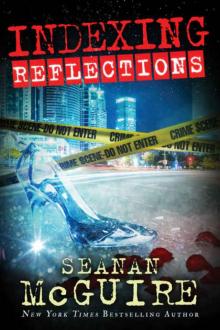 Indexing: Reflections (Kindle Serials) (Indexing Series Book 2)
Indexing: Reflections (Kindle Serials) (Indexing Series Book 2)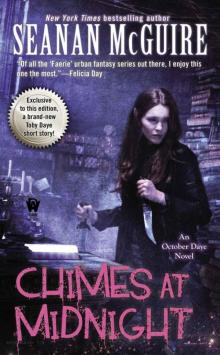 Chimes at Midnight: An October Daye Novel
Chimes at Midnight: An October Daye Novel One Salt Sea: An October Daye Novel
One Salt Sea: An October Daye Novel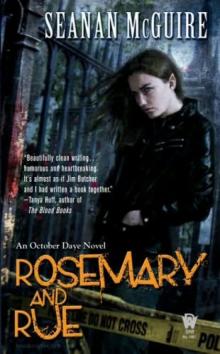 Rosemary and Rue od-1
Rosemary and Rue od-1 Rosemary and Rue: An October Daye Novel
Rosemary and Rue: An October Daye Novel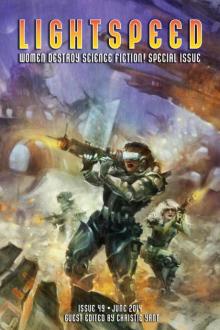 Lightspeed Magazine Issue 49
Lightspeed Magazine Issue 49 Alien Artifacts
Alien Artifacts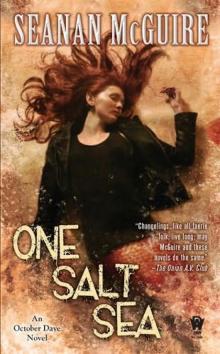 One Salt Sea od-5
One Salt Sea od-5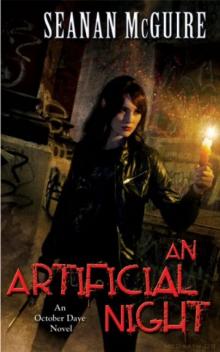 An Artificial Night od-3
An Artificial Night od-3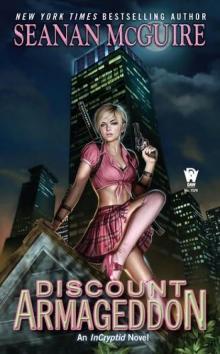 Discount Armageddon i-1
Discount Armageddon i-1